Ganbei (Bottoms up) - Chinese Drinking Culture
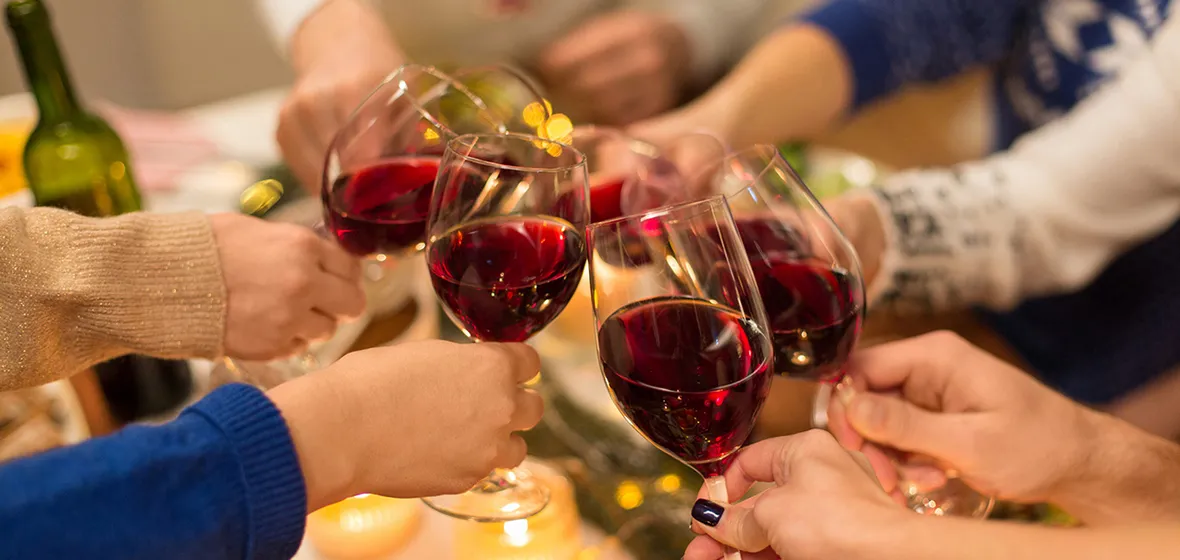
How to survive a night out drinking … in China
Warning! Before going to China on business or for pleasure, make sure you understand the cultural implications of drinking, or not drinking, alcohol, or you will most likely suffer unwanted consequences. It’s not always lighthearted fun and games in China.
To boil down this complicated issue to one sentence: You can have friends, be rich and drink …. or don’t drink and be lonely and poor. While that might seem overly exaggerated to some, anyone familiar with drinking culture in China can tell you that at best, this is a slightly black and white, yet mostly accurate, description.
The linguistics
白酒 (Bái jiǔ) (Bye – Joe) Popular Chinese hard liquor made from Sorghum
啤酒 (Pí jiǔ) (Pee – Joe) Beer
葡萄酒 (Pútao jiǔ) (Poo – Tao – Joe) Wine
黄酒 (Huáng jiǔ) (Juan – Joe) Cooking wine
* Note – due to translation errors from most electronic and online translators, be prepared for Chinese people to translate all forms of alcohol as “wine” when speaking English. Thus, you may be asked, “Do you enjoy drinking wine?”, when they actually mean to ask, “Do you like alcohol?”
The drink of choice – Chinese firewater “Baijiu”
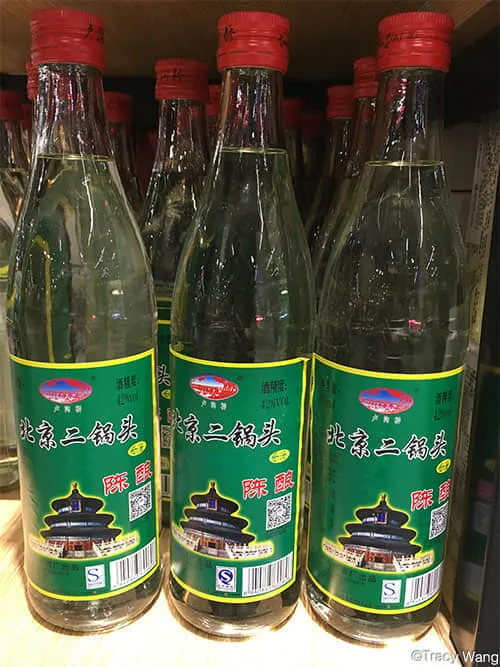
Beijing Er Guo Tou二锅头
While beer and wine are popular (wine increasingly so), the drink of choice by far is a sorghum based hard liquor called Baijiu. It’s clear, tastes little like anything drunk in the West, and can best be compared to homemade, backwater, local brews called moonshine, bootleg, hooch, firewater, etc. This is stroooong stuff and burns so intensely that even hardy drinking enthusiasts have trouble getting down a shot. But, keep in mind, this is the Chinese national drink and they are generally very proud of it, so watch any negative comments and facial expressions.
Usually, there will not be the option to drink another hard liquor instead of Baijiu – so forget about requesting some Grey Goose, Jose Cuervo, or Bacardi. Everyone drinks together and everyone drinks what’s on the table (more about this custom later). However, you might be able to request beer or even wine, which are usually available and also considered to be appropriate substitutes for the throat-scorching, dragon water being passed around.
The setting
Formal/Semi-formal occasions
It should come as no surprise that China has more of a collective culture and less of an individualistic one. Therefore, in social situations, things are done more as a group and less as an individual. Drinking is done no differently.
You’ll be at a restaurant, sitting at a round table with white table cloth, and 10-20 other people. Depending on the occasion, there could be multiple tables (for weddings, it’s of course the entire room). Snacks and then food will be served, along with copious amounts of alcohol.
However, usually everyone drinks together, at certain times (not necessarily whenever they feel like it) and rarely alone. Someone next to you may say “quànjiǔ” which means “let’s drink together” and is a way for them to propose a toast. Or, the most senior host may propose a toast for the table before the junior host does the same. Throughout the evening, there will be many, many, truly many toasts – both small toasts between you and the person next to you or on the other side of the table, and large toasts for the whole table. If it’s a wedding or other multi-table event, people will gradually begin to just walk from table to table toasting almost everyone they see. (Note: for anyone not familiar with the custom of “toasting”, it means that drinking alcohol with the toaster is pretty much obligatory.)
The drinks are usually in small shot glasses (sometimes only half the size of a regular shot glass) and will be beer or red wine if you’re lucky, baijiu if you’re not. Toasts are little more than the word “Ganbei”, although they can be longer (more on toasting below). In between toasts, there will be lots of eating, joking, storytelling (probably all in Mandarin unless you’re in a bilingual, bicultural group), and some drinking games as the night progresses. All the while, people will be toasting one another faster than a swarm of bees hitting a flower parade.
Once dinner is over, the party could continue into the wee hours of the morning at a KTV or massage parlor. If it’s a business dinner, and you want to sign a contract or close a deal, expect the night to go ‘til late.
Casual night out with a few friends
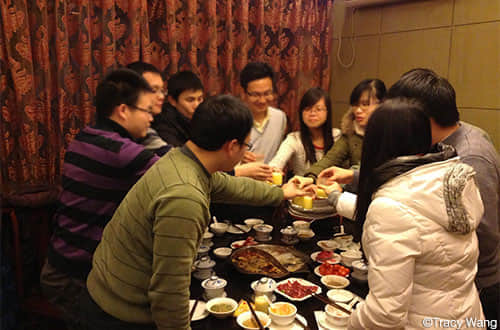
Happy hour with friends
It’s easier to describe at first what this evening will NOT be like. You probably will not go to a bar/pub type of place where everyone orders their own favorite drink. (If you do, it would be considered incredibly rude to order your own drink and not get a round for everyone else, just fyi.) You also probably won’t go to a dance club (unless you are in very cosmopolitan areas of Shanghai, Beijing, or Shenzhen with very cosmopolitan friends).
You’ll most likely end up in a restaurant type place or KTV. Either way, the night will still be a group drink-along where everyone drinks the same drink. The biggest difference between this setting, and the more formal one mentioned above, is that as a foreigner, you might be better able to get away with requesting (not ordering yourself) a different drink than the rest of the group. So, if everyone is doing Baijiu and you want to drink beer, the head of the group (usually the one who did the inviting) will order some beers for you and anyone else who wants beer. Sometimes this is totally ok, and other times you’ll be remembered for being the “weird foreigner”. The worst-case scenario would be that you don’t get another invite.
NOTE – So who pays? As a new person to a group, you’ll be considered a guest and while you should be prepared to pay for what you drink and eat or put in your share of an evenly-split bill, you very often won’t be allowed to. Chinese culture is incredibly generous in this regard as the host, or the person who invited you, will usually cover your share since you are the guest. This is almost certainly the case for more formal settings, but often the case even for casual outings especially if you are a new acquaintance to the group. If however, you are going out with an established group of Chinese friends (say, you’ve been living some place for more than 6 months), then you probably won’t be considered a “guest” any longer, will be considered a genuine member of the group, and therefore will probably be expected to pony up. If you don’t “split” everything each time (referred to as “AA” in China), and your friend(s) treat you, then the next time should be on you, and it goes back and forth like this for eternity (this is, btw, the most common form of social financial compensation on the planet).
Ganbei!
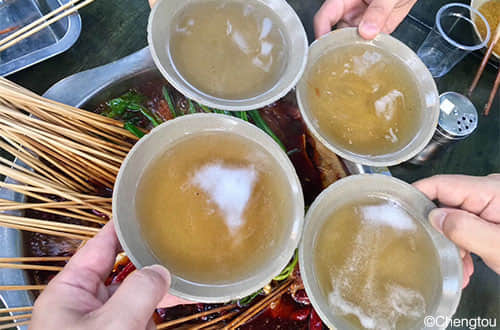
Cheers
This word is simply Mandarin for “Bottoms up!”. It’s not really “Cheers!”, “Salud!”, “Here’s to you!” as you take a sip. This is literally a translation and cultural mandate to point the bottom of your glass towards the ceiling with the open end resting on your open lips.
Proper pronunciation? Gon-Bay.
For those curious minds asking, “Would it be ok for someone to toast me with Ganbei and instead of downing the drink all at once, I just take a sip (as they down theirs)?” The answer – no, not really. It is an action considered to be a little rude by the majority of people. No one is going to force you to shotgun your drink, but it leaves an awkward, slightly offended moment, as if someone goes to high-5, or fist-bump, another person and the other person just walks by. In the end though, it’s your choice.
The rules – (mostly for formal banquets and business dinners)
The rules for each social situation (from casual nights out to formal banquets) differ slightly and of course, different people will have varying opinions and attitudes on drinking (one friend may barely touch the stuff while another friend may insist it’s a part of every social occasion). It’s important to keep this in mind when in China and be open to the possibility that the following customs may not be rigidly observed by every person you meet; however, this section will delve into the traditional rules and norms that are followed by the vast majority of Chinese society and focus mostly on more formal business and banquet dinners.
If invited to a dinner – be it a business-type meeting, a wedding, a graduation, etc. – you will more than likely be expected to drink and there will be pressure to do so (more pressure if you’re male, less pressure if you’re female). Your glass will be filled (and refilled), people will make toasts or raise their glass towards you, and … most importantly, it will be considered incredibly rude to refuse.
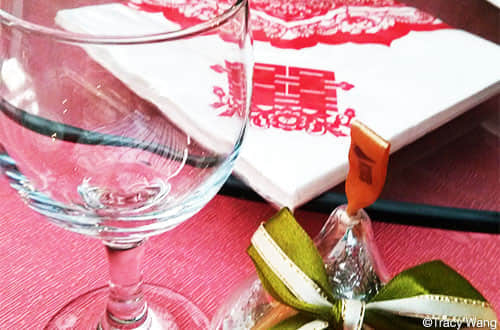
Wine glass for a wedding
China does not give the same consideration to individual preference regarding drinking as is normally done in English-speaking countries (especially in Canada and the US). In other words, “No thanks, I’m good” is not usually considered acceptable and instead will likely be considered rude, insulting, and offensive.
To illustrate, imagine being invited to someone’s house for dinner and doing one of the following: 1) not eating or drinking anything, all while sitting at the table with a disgusted look; 2) going to someone’s house for dinner and telling the host their house is ugly, their furniture looks cheap, their decoration is in poor taste. Refusing a drink in China is considered somewhere in between. Rejecting the drink is felt as a rejection of the person offering the drink and is not seen to have anything to do with a person’s personal taste preference, comfort level, tolerance, or previous drinking habits. Thus, the unintentional insult that a western may convey when turning down alcohol, will spill over into, and harm, business and social relationships.
So, what can you do if you don’t like drinking and still want to do business or have friends in China? Don’t lose hope, there are a few things you can do to diminish the negative consequences and unintentional insult from not drinking.
1) Avoid at all costs – On a personal note, I’m no teetotaler, but drinking isn’t my favorite social activity. So, on one of the dozen occasions per year I have a drink, it’s rarely more than a beer or glass of wine, and I avoid hard liquor at all costs. After living for many years in China, it’s safe to say that avoiding a drinking bash wasn’t easy. My solution to the issue was to simply avoid all occasions where I’d be pressured to drink. Luckily, my job didn’t necessitate the infamous Chinese business dinners, so my career didn’t suffer from my abstinence, but my social life did. If you don’t need to close contracts or don’t mind having fewer friends and missing out on weddings and other special celebrations, this is the best course of action. On the bright side, if you’re not a big drinker then once you make friends with other non-big drinkers, you’ll have friendships that are more likely to last and be enjoyable.
2) Be all in or all out, no middle – If you need successful business dinners for your job or want to experience all the fun of semi-formal and formal social dinners, then from the beginning, you need to decide to be all in or all out. Don’t try the middle ground of, “Ok, I’ll just have one/a little.” There is no such thing (generally) as “a little” in China and you’ll later find yourself in the unfortunate position of offending your host when you can’t drink anymore or are in the fast lane to drunk-as-a-skunk-ville.
The better option is to make up an excuse of why you can’t touch alcohol at all – no beer, wine, or liquor.

Excuses that are usually accepted are:
a) religious reasons (for example, “I’m not allowed to drink because of my religion”, which isn’t actually far fetched as Islam and some sects of Protestantism do ban alcohol consumption);
b) health reasons (for example, “I have an alcohol allergy that can kill me or make my stomach bleed”);
c) have a Chinese friend give a heartfelt, long explanation on your behalf (if you’re lucky enough to be friends with a well-respected member of the group, or the host him/herself, then they may be able to interject on your behalf and explain to the group your preference for not drinking).
d) I’m pregnant (think about this one carefully if you’ll be in the same company of people in the next 6-12 months).
Options that don’t work so well are:
a) I’m in AA/a recovering alcoholic – China does not have the same familiarity, knowledge, and acceptance regarding recovery programs as in the West and thus it may be taken as a lie. Even if you are in a program, it may not be the best excuse to give.
b) I have to work early/get up early – this usually doesn’t stop the pressure to drink and you’ll be faced with having to insult your host by flat-out refusing.
c) my spouse doesn’t like it/let me – the same as in B.
d) I’m not feeling well tonight – same as in B.
e) I drank too much last night – This would only encourage more pressure to throw ‘em back.
f) anything that mentions the police or driving – sorry, that just doesn’t cut it, and the police mention may get you a hearty laugh.
Whatever excuse you choose, make it ironclad and make sure to stick to it.
Keep in mind, even with an ironclad excuse, there may still be some obvious, lingering awkwardness. While your hosts/coworkers/friends may not have taken a full-throated offence to your rejection of their toasts, even the best sounding excuses will put a barrier between you and the rest. You may save some face and prevent the insult, but you’ll have done little to make friends or business partners.
3)Being a women kinda gets you a pass, just being a foreigner doesn’t – Women are not expected to drink as much as men, and they usually don’t get as much pressure to drink as men, especially in a purely business setting (the operative word here is “usually”, not “always”). So, practically this means that women may be able to get away with more excuses than men and not still get an onslaught of pressure. Casual settings can span the gambit from less pressure than usual to actually more pressure as your date, or friends, try to get you to ‘loosen up a little’.
Men, on the other hand, even foreign men, will still be pushed frequently to drink (unless you give one of those ironclad excuses listed in #2). In fact, if you’re the sole foreigner at the table (or one of only a few), then you could easily be considered the de facto guest of honor and in such an honorable position, it’s an honor to get your glass filled – both for you and the person doing the filling. The thought goes something like this: for the guest of honor, it’s “Look at me. I’m so popular, people can’t wait to fill my glass.”; and for the filler, it’s “Look at me. This very important person is allowing me to fill their glass and then they’re drinking what I just gave them. I must be important if they’re accepting my gift because they wouldn’t accept this from just anyone.”
4) Pace yourself – if you decide to go for it and choose the “all in” option, make sure to pace yourself. These drinking affairs can easily go for +5 hours and occasionally turn into an all-night event (say 6pm to 6am). Importantly, the drink of choice (as mentioned above) is the super strong, ultra fiery local spirit Baijiu. It doesn’t take a Big Bang physicist to calculate how long you can last throwing back these puppies. Instead, you possibly can opt for something less strong – like beer or wine. While this may not always be an option, it’s usually acceptable and available (it’s a good idea to nonchalantly inquire about Baijiu alternatives before accepting an invitation.) It may feel awkward doing “shots” of wine, but it’s probably the lesser of two evils.
Another sneakier alternative is to water down your Baijiu shots. If you see other people doing this openly, then take it as the green light to follow suit. If you don’t, then you may have to break out your best James Bond skills.
5) Food is your friend – Reaching deep into the bag of college drinking tricks, food can be your best friend. Full stomachs make alcohol take longer to be absorbed into the bloodstream, especially carbs and fat. So, in preparation for your drinking adventure, fill up as close to the drinking hour as possible, on breads, noodles, rice, fatty meats, and skins (like chicken skin). If possible, try to keep eating as long as you’re drinking. There is always plenty of food available at these dinners, but there will be a lot of vegetable dishes and seafood which do little to slow absorption and you may not really like the other food options. So, stuffing your backpack with granola or nut bars that you sneak into the bathroom isn’t a bad idea either.
6) Keep it light, Humor is a good friend too – If you’ve started down the drinking road and need to get off the highway, even if you’ve only taken a few sips or a few shots and just don’t want to drink anymore, keep in mind that humor can be a powerful friend. Depending on your crowd, you may be able to deflect some pressure (and some extra shots) by being able to make jokes at your expense. Comments like, “Oh, I’m such a baby. I just can’t drink like you guys. Hahaha.” or “I’m _____ (clumsy, loud, etc.) enough when I’m not drinking, so I really can’t get drunk tonight.” This may not completely stop the toasts and shots, but (again, depending on the crowd) it may decrease them and give you a moment to get your bearings.
7) A pinch … ‘drinker’ (borrowing from a baseball reference) – This one is a real “Are you serious??” moment. If this is a business dinner and if you have some amount of authority within your company, you can actually assign a drinking rep to drink for you. You should read that again and maybe pause before continuing, but it’s not a joke. It’s a custom followed in China, as higher-level company authorities who don’t wish to get wasted but don’t want to offend their host, will attend the dinner and bring along a drinking rep to do all the drinking for them – and they of course assign some of the highest-tolerance people on the planet. This option doesn’t really work though outside of a business-like setting.
Toasting culture and rules

It’s bad enough if you refuse a drink, don’t insult your hosts more by messing up the toasting rules too.
1) Toasts are not usually long, draw-out affairs that take minutes to complete. These types of toasts are saved for more ceremonious occasions. Often, a “toast” simply means someone turns in your direction or physically approaches you, lifts their full (shot) glass and says the magic word, “Ganbei!”. That’s it. You’ve now been toasted (or, colloquially speaking, ‘ganbeied’) and you’re now expected to grab your full (shot) glass and drink. Don’t have a full glass? No worries. The person doing the ganbeiing will gladly fill it for you before proposing the ganbei.
2) Toasts are somewhat of a power move in China. The person giving the toast is seen to have the power and the person accepting the toast is somewhat acknowledging that power. Therefore, the most senior host at a banquet will usually offer the first toast — accidentally stealing this opportunity from them is very bad form indeed. This ‘power’ issue is more the case early on in the evening than later after everyone is sloshed, but never forget what toasting truly represents in China.
3) Stand and raise your glass for formal toasts when others at the table do so.
4) In general, it’s a good rule to follow those around you, especially the elders at the table.
5) In general, avoid taking a drink alone. You should wait until a toast is given and then drink with the group. Or, wait until someone decides to toast you. Or, if you’re thirsty and really want the drink, try to find someone who you think is probably on, or below, your ‘social level’ (for example, a similar or lower rank in the company or of similar age in a social circle) and toast them.
6) You’ll want to avoid, at first ,toasting people significantly higher in rank, or older, than you as this can be seen as disrespectful (see #2). Unlike in the West, toasting the senior, important members of a group is not necessarily taken as a token of respect from the toaster to the toastee, but instead a slightly disrespectful gesture that implies you feel you are more important than he/she is. If you’re brand new to the group and you have no idea who anyone’s position is and you accidentally toast the boss at the beginning of the evening, it will usually be seen as humorous and you’ll get a pass for being a foreigner who didn’t know better. As the night wears on, it will become more acceptable to toast those of higher rank and age if you choose to do so.
7) Use your right hand to hold your glass when toasting and drinking. You can place your left hand under the glass to show greater respect while someone is giving a toast if you would like.
8) When you clink glasses together, it’s a good idea to lower yours and clink the top of your glass a bit lower than the person(s) you are toasting – this shows respect. You won’t be thrown out on your keister for accidentally clinking your glass higher than theirs, but you’ll get bonus points for properly following the cultural norms.
Getting down to business
In many western countries, people often do business sober, or mostly sober, and then get inebriated afterwards to celebrate. China kind of does this in reverse. Drinking, especially drinking to the point of getting drunk, is a way to establish trust between individuals or groups. Without it, most Chinese feel uncomfortable moving forward with people/a person who they don’t trust.
So, a question many westerns have is, “When should I get down to business?” Well, don’t do it at the table. The Chinese drinking table is not the same as a London or NYC lunch booth. Think of the table as merely the interview. You’re being sized up. You’re being evaluated on a wide range of different aspects. Mostly, people are just wondering can they trust you. Although you may hint or lightly touch on business issues at the table, the drinking session is mostly to form a human bond for doing business later — perhaps even at the late-night karaoke joint across the street. So, just relax, enjoy yourself, focus on making strong social connections, and remember that here, business can wait. Furthermore, for obvious reasons, the drinking table is not the place to sign contracts or make critical decisions.
The growing taste for wine

Some may be interested to know that wine, which has not traditionally had much of a following in China, has been growing increasingly popular since around 2000. It’s not just the consumption that’s been on the rise, but the production too as Chinese vineyards have been popping up all over the country. While very little Chinese wine is currently exported, you may want to soon keep an eye out for “Made in China” wines at your neighborhood grocer.
Status symbol – there’s no such thing as “the cheap stuff”
With alcohol being such a status and power symbol, it’s not easy to find inexpensive bottles of wine and hard liquor (unless you want Baijiu). A lot of the consumption is at the higher end of the scale with some parties resembling a club table of big name NBA or Hip-Hop stars. Some wines are proudly displayed and consumed that run tens of thousands of dollars per bottle. This only occurs of course in the richest of social circles, but if you’re lucky, you may get an exclusive invite to one of these gatherings which means that one glass of something you’re drinking may cost more than your entire trip, and the whole bottle could easily be worth more than your car.
Other tips
1) There are no spouses at formal business dinners. Business may eventually be conducted at some point in the night and those talks alone may be uninteresting to your spouse. Furthermore, the party doesn’t always end at the restaurant. It often continues to other places that are, let’s say, not exactly appropriate for taking a spouse. Many westerns would be surprised at how much business gets done in a sauna or while laying on your stomach getting a massage – neither place, in China, would be the type of place where most people would want to take their spouses.
2) Tipping is not the norm in China and your host will probably cover the check, so no need to leave a tip or offer to "chip in."
In the End

While drinking rules and norms in China may be significantly different, and stricter, than in your home country, in the end, no one is going to physically force you to drink. You may lose a business deal or some friends for not doing so, but that in and of itself isn’t the end of the world.
On the flip side, for those who enjoy drinking, you can be very successful and happy in China. You’ll get bonus points for following along with the group and for making such a good effort at keeping up. In fact, anyone who at least tries hard to accept toasts, especially Baijiu toasts, will get some credit for doing so even if they have to bow out early and stop accepting every toast from every person. You’ll also have a front row seat to a side of Chinese culture few get to experience and may end up having the time of your life. Afterall, the Chinese haven’t continued this tradition for 1000s of years because it’s dull and boring. For the more reluctant, maybe you can think of this using the age-old Las Vegas adage - what goes on in China, stays in China. For many adult travelers, a good ole Chinese drinking fest may be the perfect excuse to let loose and have some fun without your party antics necessarily ending up on someone’s Facebook feed (btw, Facebook is still banned in China).
For women, the bonus points multiply. A western woman who can keep up with everyone at the table, especially at a baijiu fest, and walk out on her own accord while many others are knocking glasses over and accidentally pulling tablecloths off, will usually win mad respect from literally everyone.
Also, these events don’t happen every weekend. As a visitor to China, you’ll be lucky to attend just one event like this. If you have to travel for extended periods on business or move to China on your own, these events may happen only once every couple of months.
So, are several hours of taste bud seething, tongue numbing, fire water or non-stop beer guzzling ‘til you can’t see straight worth that contract or getting a new group of friends? Everyone is free to make that decision for themselves. Ganbei!

 Chinese Beverages
Chinese Beverages 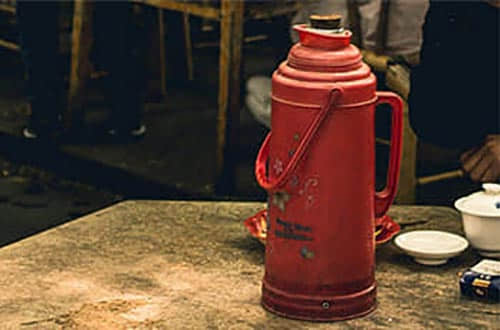 Hot Water in China
Hot Water in China  In China, Who Pays?
In China, Who Pays?  Chinese Tea
Chinese Tea